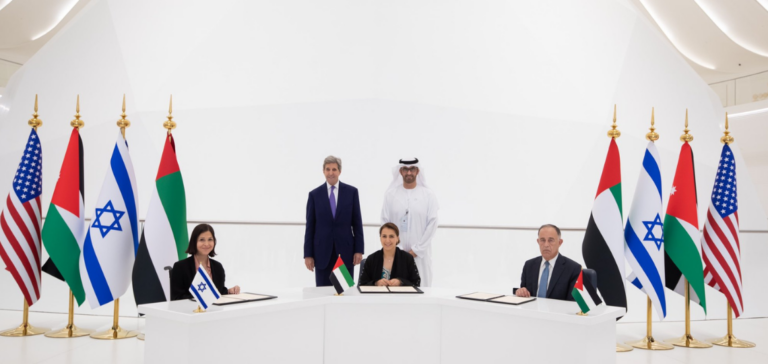In an international context marked by growing tensions, Jordan recently took a significant decision concerning its diplomatic and trade relations. Jordan’s Foreign Minister, Ayman Safadi, said in an interview with Al-Jazeera that his country will not proceed with the signing of a previously envisaged energy agreement with Israel. This decision comes against a backdrop of heightened tensions due to the current situation in the Gaza Strip.
Implications of the Situation in Gaza for Regional Relations
The agreement in question, which involved an exchange of solar energy for water between Jordan and Israel, was originally scheduled to be finalized last month. However, the deterioration in relations between Israel and the Palestinian territories, marked in particular by an escalation in hostilities, has prompted Jordan to reconsider its position. Safadi expressed his discomfort at the idea of signing such an agreement in the current context, questioning the possibility of maintaining normal peaceful relations with Israel in such a climate of tension.
Background to the Energy-Water Agreement
The origins of this agreement date back to November 2021, when a declaration of intent was signed by the two nations in Dubai. Under the aegis of the United States, this agreement was designed to enable Jordan to supply solar energy to Israel, in exchange for desalinated water. This project was part of a regional cooperation program aimed at strengthening economic and environmental ties between the two countries.
Public and diplomatic reactions in Jordan
Jordan, which shares borders with Israel and the West Bank, a Palestinian territory occupied by Israel since 1967, signed a peace treaty with Israel in 1994. Indeed, this treaty, considered a milestone in Israeli-Arab relations, paved the way for increased economic and security cooperation between the two countries. However, recent events have highlighted the fragility inherent in this relationship. Jordan’s decision not to sign the agreement follows a series of demonstrations in Amman, where citizens expressed their solidarity with the Palestinians and demanded the cancellation of the peace treaty with Israel.
The situation was further intensified by the early November recall of the Jordanian ambassador to Israel. However, this diplomatic move was a direct response to Israel’s military offensive in the Gaza Strip, triggered by an attack by the Palestinian Hamas. Moreover, the current context illustrates the complexity of Israeli-Palestinian relations and the difficulty of maintaining regional stability in such a volatile environment.
Jordan’s decision to suspend the signing of the energy agreement with Israel highlights the growing tensions in the region, exacerbated by recent events in Gaza. Indeed, this development raises questions about the future of Israeli-Jordanian relations and the impact of the situation in Gaza on regional stability. What’s more, the current situation ushers in a period of uncertainty and reassessment of alliances and agreements in an already complex region.





















